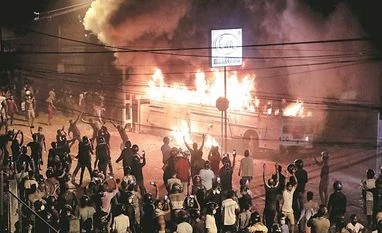The Sri Lankan government on Saturday imposed a 36-hour curfew as a nationwide public emergency has been enforced ahead of a planned anti-government rally over the worst economic crisis in the island nation that has hit the common man badly.
The island wide curfew has been imposed with effect from 6 pm Saturday to 6 am Monday (April 4), the information department said.
President Gotabaya Rajapaksa has given the directive under the Public Security Ordinance regulations, it said.
The move came as the island nation braced for country-wide protests on Sunday against the government's poor handling of the ongoing economic crisis where people currently endure long hours of power outages and scarcity of essentials. The imposition of curfew would prevent citizens from holding protests.
President Rajapaksa issued a special gazette notification late on Friday night, declaring a public emergency in Sri Lanka with immediate effect from April 1.
In the gazette, the President states: Whereas I am of the opinion that by reason of a public emergency in Sri Lanka it is expedient to do so in the interests of public security, the protection of public order and the maintenance of supplies and services essential to the life of the community.
Also Read
Commenting on the emergency, independent think-tank Centre for Policy Alternatives said that regulations may impose restrictions on certain fundamental rights guaranteed by the constitution one of them would be among others: the rights to freedom of expression, assembly, association, movement, occupation, religion, culture and language.
Lawyers commented that the regulations gave the police sweeping powers to arrest anyone for unlawful assembly.
The regulations must be approved in Parliament every 30 days from their imposition.
The declaration came at the same time as the court ordered bail to a section of the protesters arrested for the demonstration opposite Rajapaksa's private residence on Thursday.
Lawyer Nuwan Bopage, who was among around 500 lawyers gathered at the Colombo suburban Gangodawila magistrate's court to give free counsel, said that out of the 54 arrested, as many as 21 were given bail. Six were remanded until April 4.
The rest of the 27 are in hospitals with severe assault injuries.
This was a very significant ruling. The court asked the police to file evidence of each of their involvement in acts of violence. They could not do so, Bopage said.
The government blamed the Rajapaksa residence incidents on an extreme group connected to the Opposition political parties.
The protesters said that participants had no political motivation and were only looking for solutions from the government for the hardships heaped on the public.
Several people were injured and vehicles were set on fire as the agitation turned violent. Police fired tear gas and water cannons at the protesters after they pulled down a steel barricade placed near the president's residence. Following the incident, several people were arrested and a curfew briefly imposed in most parts of Colombo city.
A statement issued by the presidential media division on Friday said an extremist group was behind the unrest near President Rajapaksa's residence in Mirihana.
The police said that five policemen were injured, while a police bus, a jeep and two motorcycles were burnt as protesters turned violent. The demonstrators also caused damage to a police water cannon truck.
A Sri Lankan man on Saturday alleged that his son, who is a social media activist, has been abducted by the police after a state of emergency amidst protests over the country's worst economic crisis.
Anurudda Bandara's father said his son was taken away by someone from the north Colombo police station of Modera on Friday night.
According to the police, he was wanted to be questioned over his social media activities.
Sri Lanka is currently experiencing its worst economic crisis in history. With long lines for fuel, cooking gas, essentials in short supply and long hours of power cuts the public has been suffering for weeks.
Meanwhile, a consignment of 40,000 metric tonnes of diesel from India reached Sri Lanka on Saturday, the fourth such assistance from New Delhi, to mitigate the spike in power cuts in the island nation, which is facing an unprecedented economic and energy crisis caused due to shortage of foreign exchange.
Rajapaksa has defended his government's actions, saying the foreign exchange crisis was not his making and the economic downturn was largely pandemic driven where the island's tourism revenue and inward remittances waning.
(Only the headline and picture of this report may have been reworked by the Business Standard staff; the rest of the content is auto-generated from a syndicated feed.)
)